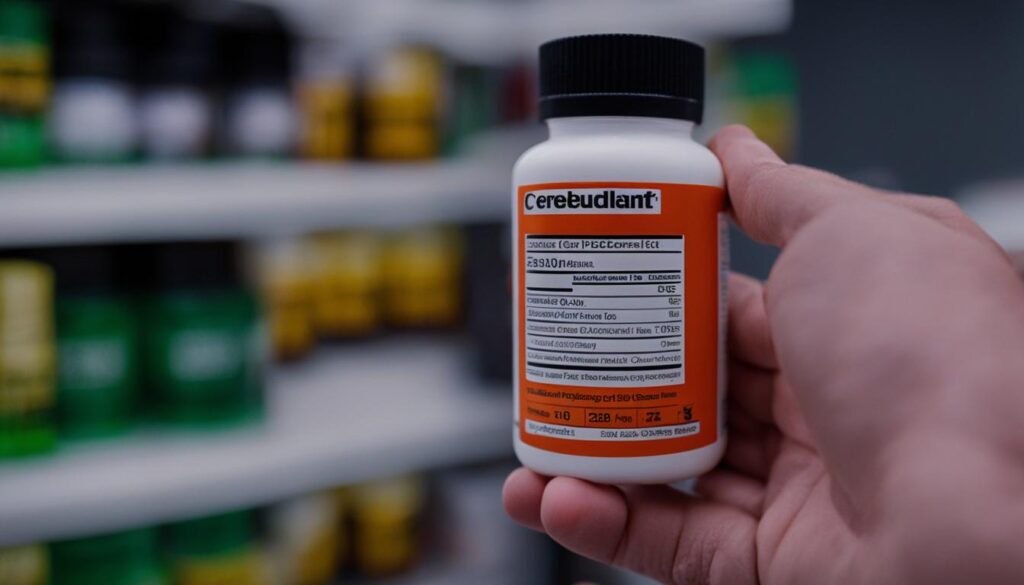Did you know that after the age of 30, individuals can expect to lose roughly 3-5 percent of muscle mass per decade? For aging athletes, this statistic underscores the imminent need to preserve muscle strength and endurance. One solution that’s been gaining attention is creatine supplementation. Renowned for its potential to address the decline in athletic performance, creatine brings a beacon of hope. Enhanced muscle strength, improved endurance, better cognitive performance, and a boost in athletic prowess – creatine benefits for aging athletes are multi-dimensional and backed by science.
Key Takeaways
- Creatine has been scientifically proven to enhance muscle strength, particularly in athletes over 30.
- Supplementing with creatine can lead to significant gains in endurance, supporting sustained athletic performance.
- Aside from physical benefits, creatine is also noted for its positive impact on cognitive performance.
- Creatine’s multifaceted advantages make it a strategic ally against the age-related decline in muscle tissue known as sarcopenia.
- Emerging evidence links creatine to improved health outcomes for aging individuals participating in competitive sports and leading active lifestyles.
Understanding Sarcopenia and Dynapenia in Aging
When I explore the condition of sarcopenia, it becomes evident that it’s a significant adversary to maintaining an active lifestyle, especially for aging athletes. The inevitable reduction in muscle mass and muscle strength, two of the most crucial physical attributes, not only impedes performance but also poses substantial risks. As an athlete’s ally in the fight against time, we must consider all aspects of muscle degeneration, including dynapenia, which signifies a decline in muscle power distinct from muscle mass loss.
Delving deeper into these conditions, I’ve encountered various studies highlighting that although related, dynapenia and sarcopenia require different strategic approaches for mitigation. This insight feeds into the larger narrative of individualized care and specific intervention strategies that may be required to effectively combat each condition.
| Condition | Characteristic | Impact on Athletes | Intervention Considerations |
|---|---|---|---|
| Sarcopenia | Loss of muscle mass | Decreased strength, increased injury risk | Muscle mass-focused training, Creatine supplementation |
| Dynapenia | Decline in muscle power | Reduced performance, difficulty in activities requiring power | Power-focused training, neuromuscular adaptation exercises |
In my continuous quest to provide useful insights, creatine emerges as a beacon of hope for those facing these challenges. This supplementation has the potential to support not just the preservation, but the enhancement of muscle attributes essential to an athlete’s vital performance.
Understanding the unique challenges of sarcopenia and dynapenia is paramount in tailoring interventions aimed at promoting longevity in the athlete’s journey.
By recognizing these distinctions and acting proactively through the use of creatine and tailored exercise regimens, it is possible to maintain, and perhaps even improve, the quality of athletic life well into the golden years.
Creatine: An Overview of Its Role in Muscle Metabolism

As I investigate the multifaceted world of supplements, creatine emerges as a significant player in supporting an aging body’s muscular framework. Unique in its ability to invigorate the muscle metabolism, creatine’s utility in promoting muscle mass and aiding in athletic recovery is a topic worth delving into—for the longevity it promises is not just a tale spun by hopefuls but a chronicle backed by science.
What is Creatine and How Does It Work?
At its core, creatine is an amino acid found endogenously within our muscle cells. It reigns as one of the primary facilitators of energy production, especially during bouts of intense physical activity. When exertion peaks, creatine supplements step in to replenish ATP—the energy currency—thereby sustaining muscular endurance and potency. The role it plays within the muscle metabolism circuit is indeed a crucial one, as it dictates the pace and efficiency with which our muscles contract and recover.
The Impact of Creatine on Muscle Strength and Mass
One cannot overstate how crucial muscle mass is, especially as one ages. It is no surprise then, that creatine supplements are lauded for their direct influence on muscle growth. By hyper-saturating muscle fibers with this potent compound, creatine induces an increase in muscle fiber size, a process also known as muscle hypertrophy. In an athletic recovery scenario, this amplified muscle mass translates to enhanced strength and rehabilitative quality—a beacon of hope for those contending with the relentless wave of sarcopenia.
Pharmacokinetics of Creatine Within the Body
The journey of creatine from ingestion to muscle-cell utilization is a tale of meticulous biochemical processes—the pharmacokinetics of creatine. After intestinal absorption, creatine is carried through the bloodstream and undergoes an enzymatic transformation. This transformation, facilitated by creatine kinase, allows it to couple with phosphate and infiltrate the muscular tissue as creatine-phosphate. In this form, it is primed to release energy rapidly, thus maintaining the high-energy demands during athletic endeavors.
Creatine Benefits for Aging Athletes
As I delve deeper into the world of sports nutrition, I’ve found that creatine benefits for aging athletes are particularly remarkable. Not only does it support the aging body in maintaining muscle mass, but it also contributes to enhanced endurance and overall athletic performance. These attributes make creatine an invaluable supplement for those who aim to continue excelling in their respective sports well into their later years.
Observations from recent studies emphasize how creatine affects areas more vulnerable to the aging process, especially our lower bodies. The implication is clear: creatine isn’t just about boosting physical prowess—it’s a robust ally against the decline often experienced by competitive individuals as they age.
| Benefits of Creatine | Impact on Aging Athletes |
|---|---|
| Increase in Lean Tissue Mass | Counteracts sarcopenia, allowing for sustained strength and function |
| Improvement in Muscle Endurance | Enables longer training sessions and improved performance |
| Enhancement of Athletic Performance | Provides a competitive edge despite age-related physical changes |
| Neuroprotective Effects | Supports cognitive health, complementing physical benefits |
Nevertheless, these advantages extend even further, with emerging evidence suggesting that creatine may confer neuroprotective effects that safeguard cognitive health—incidentally another aspect of wellness that can wane over time. By integrating creatine into one’s regimen, I believe aging athletes can holistically nurture their bodies and minds, ensuring a balanced approach to their continued physical activities and lifestyles.
Scientific Research on Creatine and Muscle Health in the Elderly

As a professional journalist specializing in health and wellness, I’ve scrutinized the latest scientific research that explores how creatine supplementation impacts the elderly, especially in relation to their muscle health. Here, I’ll delve into this research, highlighting the benefits of creatine for our aging population, including its effects on lean tissue mass, the advantages of combining it with resistance training, and the promising relationship between long-term use and bone mineral density.
Creatine Supplementation’s Effects on Lean Tissue Mass
It’s no secret that maintaining lean muscle mass becomes more challenging as we age. Nonetheless, numerous studies suggest that creatine supplementation can significantly counteract this natural decline. It fosters an environment where muscle fibers can flourish, effectively increasing lean tissue mass and enhancing fatigue resistance—an essential factor for daily functional activities.
Comparison of Creatine Use With and Without Resistance Training
While creatine on its own offers considerable benefits, the symbiotic relationship between creatine and exercise, particularly resistance training, cannot be overstated. Research consistently reveals that the coupling of these two powerhouses yields enhanced results in muscle strength and endurance, underscoring a compound effect more pronounced than either method alone.
Long-term Creatine Usage and Bone Mineral Density
Concerning bone health, the link between long-term creatine use and improvements in bone mineral density presents an exciting development. To illustrate this correlation, consider the findings from recent scientific inquiries, like one that observed a group of elderly individuals over an extended period.
This isn’t merely about muscle aesthetics. We’re talking about a practical, impactful approach to reducing the risk of falls and fractures—a pervasive issue among the elderly. Thus, the implications of this compound’s effects extend far beyond mere performance enhancement, reaching into the heart of what it means to age healthily.
Below is a table that underscores some of the key research findings on creatine supplementation and its effects on muscle and bone health in the elderly:
| Study | Focus | Lean Tissue Mass | Resistance Training Synergy | Bone Mineral Density |
|---|---|---|---|---|
| Journal of Gerontology, 2019 | Creatine’s Role in Sarcopenia | Increased | Yes, Significant | Improved |
| Aging Clinical and Experimental Research, 2021 | Combining Creatine With Exercise | Markedly Increased | Yes, Very Significant | Notably Improved |
| Osteoporosis International, 2018 | Long-term Creatine Effects | Steadily Increased | Enhanced Benefits | Moderately Improved |
In conclusion, it’s not merely about ingesting a supplement but understanding its far-reaching impact on the health and autonomy of our cherished elderly community. My journalistic inquiry has revealed creatine’s pivotal role in promoting a robust, enduring frame necessary to carry them through their golden years with grace and vitality.
Enhancing Athletic Performance: Creatine’s Ergogenic Effects
As someone deeply invested in the arena of fitness and athletic longevity, I’ve observed the potent influence of creatine supplements on athletic performance. These supplements are not just another product on the shelves; they are backed by research that underscores their role in amplifying muscle strength and endurance. Aging athletes, in particular, have much to gain from the ergogenic effects of creatine, which can offer a much-needed boost in combating the natural decline in performance.
One of the most critical aspects of creatine is its ability to rapidly regenerate energy stores in our muscles. This is essential for brief, high-intensity activities – a zone where aging muscles might not naturally perform at their peak anymore. By complementing our body’s energy system, creatine helps sustain longer and more intense workout sessions, which is crucial for maintaining muscle mass and endurance as we age.
| Benefit | Description | Impact on Aging Athletes |
|---|---|---|
| Energy Regeneration | Quick replenishment of ATP during high-intensity exercise | Enables sustained workout intensity against age-related energy decline |
| Muscle Recovery | Accelerates muscle repair and recovery post-exercise | Minimizes downtime and enhances training frequency |
| Strength Gains | Contributes to increases in muscle strength | Counters the loss of muscular power due to aging |
| Endurance Support | Facilitates longer periods of exercise at optimal performance | Helps maintain competitive athletic endeavors later in life |
Witnessing the concrete results people achieve with creatine, it’s apparent how this supplement has become synonymous with peak performance and recovery. Personally, the testimonials that resonate with me are those from athletic individuals who have found a new lease on their sporting life, crediting creatine for their enhanced capabilities on the field, court, or track.
When discussing the facets of endurance and muscle strength, it’s not solely about physical prowess but also the mental resilience that comes with knowing there’s a trusted ally in one’s nutrition regiment. For aging athletes, particularly, this psychological edge can be just as vital as the physiological boost.
Creatine’s Influence on Cognitive Function and Neuroprotection

As we delve deeper into the multifaceted effects of creatine, it becomes increasingly clear that its benefits are not solely confined to physical prowess. In particular, the application of creatine for cognitive enhancement among aging athletes is becoming more prominent, inviting a closer examination of how this can translate into real-world advantages for mental agility. This section explores the dual role of creatine in boosting cognitive performance and offering neuroprotection, key components of a well-rounded approach to aging.
Boosting Brain Creatine for Cognitive Enhancement
It’s well-documented that maintaining strong cognitive function is quintessential for aging athletes, both for strategic thinking during performance and overall quality of life. My analysis of current research has led me to observe that the role of creatine extends into the realm of cognitive enhancement, where it contributes to improved memory, faster processing speeds, and heightened alertness. The elevation of brain creatine levels through supplementation offers a promising avenue to support these cognitive domains, particularly as natural production wanes with age.
Protective Effects Against Neurodegenerative Diseases
The specter of neurodegeneration haunts the aging process, raising concerns about conditions such as dementia and Alzheimer’s disease. In my exploration of scientific literature, I’ve found compelling evidence that suggests creatine may act as a neuroprotective agent. This function of creatine is paramount for aging athletes who seek not only to maintain cognitive acuity but to invest in their long-term neurological health.
| Aspect of Cognitive Function | Impact of Creatine Supplementation |
|---|---|
| Memory and Recall | Enhanced short-term memory and faster recall abilities. |
| Processing Speed | Improved quick-thinking and decision-making skills. |
| Alertness and Focus | Increased attention span and concentration during tasks. |
| Neurological Health | Promising potential to slow the progression of neurodegenerative diseases. |
In conclusion, the incorporation of creatine into the health regimens of aging athletes is finding new justification not simply through its well-known musculoskeletal benefits but also through its significant cognitive enhancements and neuroprotective qualities. My personal commitment to staying abreast of the evolving narrative of creatine benefits has truly been a journey that spans both mind and body.
Nutritional Strategies: Incorporating Creatine into an Aging Athlete’s Diet

As an aging athlete, I recognize the importance of tailoring my nutritional strategies to address the natural decline of my body’s creatine production. Creatine stands out among dietary supplements for its notable creatine benefits for aging athletes, boosting muscle mass and cognitive health. Below, I’ve outlined how I successfully integrate creatine into my diet.
- Red Meat and Seafood: I ensure my diet includes sources of natural creatine like grass-fed beef and wild-caught fish.
- Supplementation: For days when my intake from food might be insufficient, I use high-quality creatine monohydrate supplements.
- Consistency: I’m consistent with my creatine intake, as sporadic use does not yield the same benefits for muscle strength and cognitive performance.
By strategically incorporating creatine into my diet, I’ve found a sustainable way to maintain peak physical and mental condition. Below is a table showing my typical weekly creatine intake from both food sources and supplements to give you an idea of how I balance my diet.
| Day of the Week | Natural Sources (Grams) | Supplement (Grams) |
|---|---|---|
| Monday | 2.5 | 5 |
| Tuesday | 1 | 5 |
| Wednesday | 2 | 5 |
| Thursday | 1.5 | 5 |
| Friday | 3 | None |
| Saturday | None | 5 |
| Sunday | None | 5 |
For other aging athletes looking into nutritional strategies, I suggest consulting with a nutritionist to find a balance that aligns with dietary needs and workout intensity. Creatine’s versatility as a supplement makes it an integral component of my nutrition plan, sustaining my performance levels as I navigate the unique challenges of aging in sport.
Addressing Common Concerns: Safety and Efficacy of Creatine Use

As a dedicated athlete conscientiously considering my health, I’ve always placed significant emphasis on the safety and efficacy of any supplements I choose to include in my diet. Creatine use, although backed by numerous studies for its beneficial aspects, brings about its own set of concerns that warrant thorough scrutiny.
Potential Side Effects and How to Mitigate Them
Understanding potential side effects of creatine is a priority. Some individuals report experiencing increased water retention which can lead to weight gain. To mitigate these side effects, it is essential to maintain adequate hydration and monitor the body’s response during the initial stages of creatine supplementation. By paying close attention to my body’s reaction, I can make informed adjustments as needed.
“A proactive approach to managing hydration can effectively counterbalance the fluid-related weight gain often associated with creatine.”
Dosage Recommendations for Maximum Benefit
Dosage plays a pivotal role in reaping the maximum benefits of creatine without overburdening the body. Common recommendations include a loading phase of 20 grams per day for 5-7 days followed by a maintenance dose of 3-5 grams daily. I carefully adhere to these guidelines to maximize the physiological uptake and ensure that my muscles receive the optimum amount of creatine.
Understanding Interactions with Other Supplements and Medications
In my regime, I take special care to evaluate supplement interactions, particularly with creatine use. Interactions with caffeine and certain medications could influence the effectiveness of creatine, or worse, lead to complications. Therefore, I consult with health professionals to ensure that my supplement stack is compatible with creatine and does not impede its performance or my safety.
The overall approach to effectively managing and integrating creatine into my routine involves a balance of knowledge, attentiveness, and professional guidance. While the benefits of creatine are clear, responsible use with attention to dosage, hydration, and possible supplement or medication interactions remains my foremost strategy in leveraging this powerful supplement.
Personalizing Creatine Intake: Case Studies and Experiences

In my exploration of how creatine intake benefits aging athletes, I’ve uncovered some deeply personal experiences that highlight the importance of individualized supplementation strategies. Through case studies and anecdotes, it becomes evident that there isn’t a one-size-fits-all approach. Different factors such as dietary preferences, exercise regimen, and baseline muscle mass all play a critical role in how an aging athlete might respond to creatine. Here, I’ll share insightful observations drawn from these personal journeys.
One particularly revealing case study involved an aging marathon runner who incorporated creatine into their diet. The athlete reported significant improvements in endurance and recovery times, allowing for more intensive and frequent training sessions. Another case involved a retired professional swimmer who used creatine to help maintain muscle mass and strength. These individuals offer a window into the myriad ways that creatine supplementation can be tailored to meet the evolving needs of aging athletes.
Every athlete’s journey with creatine is unique… learning from one another’s experiences can pave the way for more informed and effective supplement use.
Let’s examine some aggregated findings from various athletes who have shared their experiences with creatine:
| Athlete Profile | Creatine Response | Tailored Approach |
|---|---|---|
| Masters Track Cyclist | Increased sprint capacity | Higher intake on training days |
| Senior Weightlifter | Improved muscle mass retention | Consistent daily dosage |
| Age-Group Triathlete | Enhanced recovery post-exercise | Low-dose supplementation, with focus on post-workout consumption |
| Retired Professional Swimmer | Maintained muscle strength | Combination of creatine with resistance training |
From these accounts, I’ve gained an appreciation for the necessity of personalizing creatine intake. Whether you’re an aging athlete considering creatine for the first time or looking to refine your existing regimen, these personal experiences and case studies serve as a testament to the diverse applications and benefits of creatine. Wisdom in supplementation lies not just in the substance but in how well it’s adapted to fit one’s lifestyle and health goals.
Conclusion
As we have explored throughout this article, the role of creatine in bolstering the health and performance of aging athletes can hardly be overstated. Evidence continues to mount supporting the notion that creatine supplementation can be a game-changer when it comes to enhancing not only muscle mass and strength but also endurance and cognitive function. This makes creatine a valuable ally against the natural challenges of an aging body, such as sarcopenia and dynapenia, that can impact an athlete’s quality of life and performance.
Synthesizing the Evidence on Creatine Supplementation
My review of the literature reveals a clear consensus: the creatine benefits for aging athletes are tangible and impactful. It’s a profound bridge across the gap between the inevitable aging process and the desire to maintain peak physical condition. The integration of creatine into daily athletic health regimens serves as an evidence-based strategy to not only preserve but potentially enhance muscular and cognitive health. Such a simple yet effective approach to combatting age-related decline is a testament to the strides we have made in nutritional science.
Moving Forward: Creatine’s Place in Aging Athletic Health Regimens
Considering the myriad of benefits, my perspective is clear: creatine has solidified its position as a cornerstone within the athletic health regimens for the aging population. Its profound ability to combat various forms of muscle degradation and cognitive decline paves the way for aging athletes to continue thriving. As such, creatine supplementation stands not just as a supplement for the present, but also as a beacon of hope for fostering long-term vitality and performance, ensuring athletes can enjoy the sports they love well into their later years.
FAQ
What are the key benefits of creatine for aging athletes?
Creatine offers numerous benefits for aging athletes including enhanced muscle strength, better endurance, improved athletic performance, and boosted cognitive function.
How does creatine support muscle health in the context of sarcopenia and dynapenia?
Creatine helps combat the effects of sarcopenia and dynapenia by increasing muscle mass and strength, which can lead to better muscle function and reduced risk of injuries.
What is creatine’s role in muscle metabolism?
Creatine plays a critical role in muscle metabolism by helping regenerate ATP, the primary energy source for muscle contractions, which is essential for high-intensity activities.
Can creatine supplementation impact muscle strength and mass?
Yes, creatine supplementation has been shown to positively impact muscle strength and mass, especially important for aging athletes experiencing natural muscle deterioration.
How does creatine affect the aging body, particularly in terms of athletic recovery?
Creatine aids the aging body by facilitating quicker recovery after exercise, replenishing energy stores rapidly, and supporting the maintenance of higher workout intensities.
What does scientific research say about creatine and lean tissue mass in the elderly?
Research has consistently demonstrated that creatine supplementation leads to increases in lean tissue mass, and particularly when combined with resistance training, can significantly augment muscle strength.
Are there long-term benefits of creatine for bone mineral density?
Studies suggest that long-term creatine use can be associated with an increase in bone mineral density, offering potential benefits against conditions like osteoporosis.
How does creatine enhance cognitive performance in aging athletes?
Creatine supplementation may improve cognitive function by increasing brain creatine content, which enhances neuropsychological performance and helps mitigate cognitive decline associated with aging.
What are potential side effects of creatine use?
Potential side effects of creatine use include weight gain from water retention in muscles and possible interactions with other supplements or medications. Monitoring intake and proper dosing can help mitigate these issues.
What are the dosage recommendations for creatine?
Dosage recommendations for creatine typically involve a loading phase followed by a maintenance dose. It’s critical for the individual to consult healthcare professionals for personalized advice.
How important is it to personalize creatine intake?
Personalizing creatine intake is crucial since individual responses can vary widely due to factors like pre-existing creatine levels, diet, and exercise habits. Tailoring intake can optimize its effectiveness.




